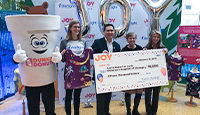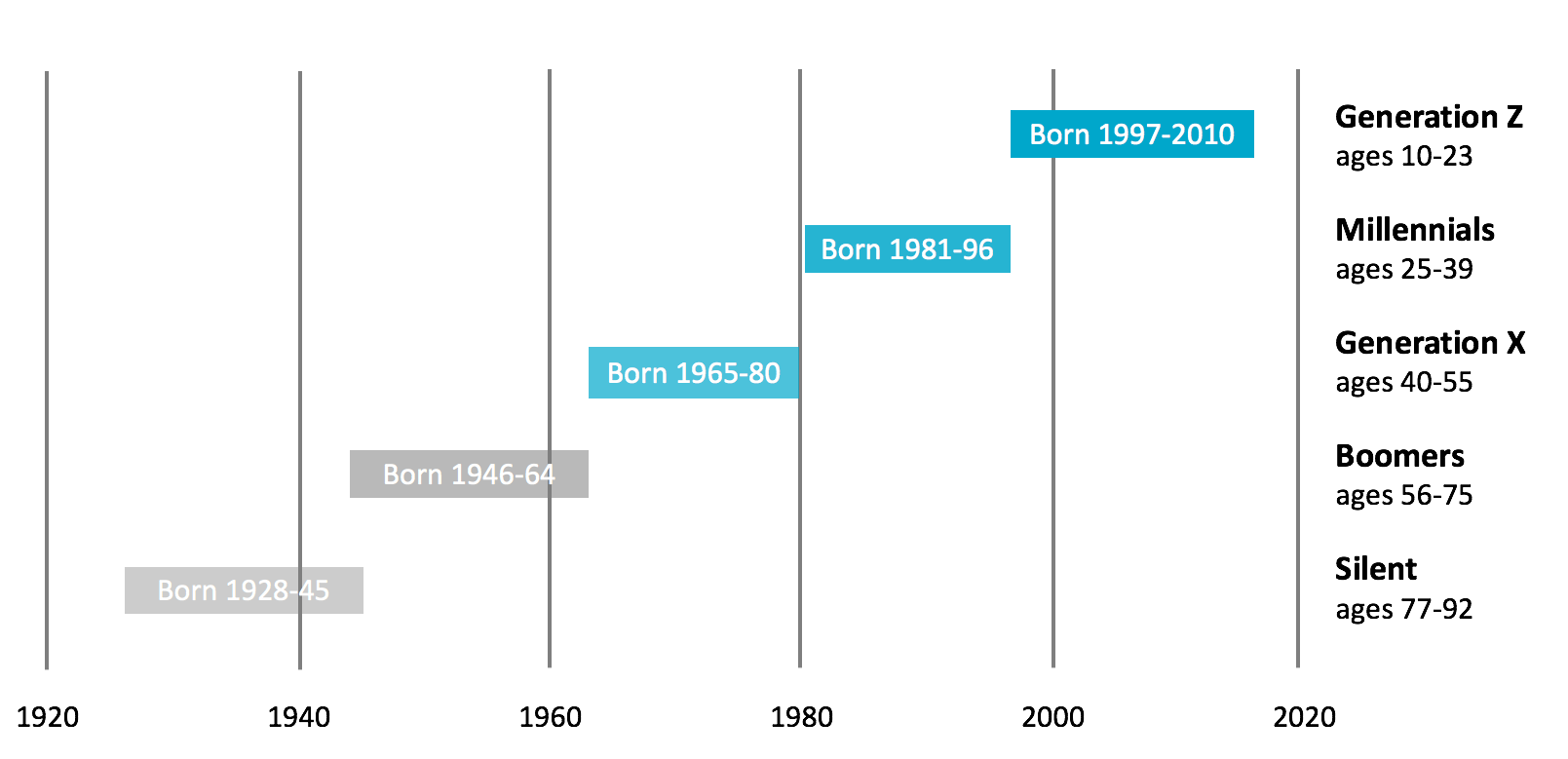Written by: Courtney Healy, Strategy Director
As an ad agency, one of the first questions we ask our clients is, “who is your target market?” And usually the response is something along the lines of— “well everyone, really.”
‘Everyone’ is not a target market. Without a detailed understanding of your target markets, you could be losing business and missing out on opportunities.
While target markets are not equal to demographics, when thinking of your target market, demographics tend to top the list of defining characteristics. Age and generation can offer a lot of insight into people’s attitudes, outlooks and experiences.
Generational cohorts provide a way to understand how different experiences interact with the lifecycle and aging process to shape people’s views of the world.
There are three primary factors that influence a generation: age, societal norms and technology. Having a deep understanding of each generation helps marketers reach and influence their target markets.
GENERATION X
Ages 40-55
Generation X is often referred to as the ‘neglected middle child,’ ‘latch key kids,’ or even the ‘overlooked generation.’
Although the smallest generation, they have enormous buying power. They are reaching the peak in their careers and carry tremendous influence over other generations. Their parents are over the age of 65 and likely relying in some way on their latch-key kids to make decisions. Gen Xers are also raising Generation Z.
Generation X came up in an era of…
Two-income families and rising divorce rates.
This has made them independent, resourceful and self-sufficient.
A faltering economy.
Many Gen Xers lived through tough economic times in the 1980s—seeing their workaholic parents lose their hard-earned positions. This has made Gen Xers less loyal to employers, and more willing to change jobs in order to get ahead.
Fact: there are more entrepreneurs in Generation X than any other generation.
Technology revolution.
Generation X and the older millennials (born before 1985) are deemed “the lucky ones.” They were young enough to eagerly embrace things like home computers but were a youth untouched by social media.
They were the first children to grow up figuring it out, as opposed to having an innate understanding of new technology the way younger generations do.
This has made Generation X ambitious and eager to learn new skills. They often switch between laptops, phones and tablets, as opposed to Millennials that primarily use their phone.
Marketing to Generation X
These experiences have made Generation X shrewd, value-driven shoppers. They research far and wide before making a purchase and seek the best deal. They tend to be cynical and sophisticated when it comes to products, ads and shopping, and they demand reliability.
Best practices for marketing to Generation X
- Use subtle persuasion
- Educate them into buying
- Be straightforward and credible
- Provide a personalized brand experience
Key messages that resonate with Generation X
- Family
- Health
- ‘Playing it safe’
- Value
MILLENNIALS
Ages 25-39
Known as generation “me,” Millennials are the most studied and talked about generation. They are larger and more diverse than previous generations. And they are diverse in more ways than one – they have a wide spectrum of tastes, behaviors and income levels.
Millennials are highly educated. And, they are a very lucrative market – with over $200 billion (and growing) in spending power.
Millennials came up in an era of…
Digital Technology.
Millennials grew up during the rapid rise of the internet, mobile devices and social media and adapted as new technology emerged. They are technologically savvy—millennials do everything tech-related in higher percentages than all other generations before them. They also see the value of technology as a means to improve their lives.
This has led to Millennials being constantly connected, having short attention spans and wanting everything (especially information) on-demand.
9/11.
Millennials were between the ages of 6 and 20 when the 9/11 terrorist attacks took place. 9/11 and its complicated aftermath represent a loss of innocence that dimmed their world view but demonstrated the importance of community.
The period of intense unity in the aftermath of 9/11 reinforced their importance of community and family “on a subliminal level” and instilled a sense of social responsibility.
The great recession and skyrocketing student loan debt.
The great recession represented a sharp decline in economic activity in America from 2007-2009. This was a time when many millennials were trying to enter the workforce. High unemployment rates and crippling student loan debt created the infamous trait this generation is known best for: failure to launch.
Millennials put off life milestones simply because they couldn’t afford it. Moving out of their parent’s house, marriage and families. In general, they’ve started their “economic lives” late.
Marketing to Millennials
65% of millennials start interactions with brands online. And they want a seamless shopping experience that melds the online and offline worlds. Millennials would rather have an unforgettable experience than seek out luxury.
Millennials feel empowered by the content they are discovering and like to share that empowerment with others. They appreciate thought leadership and tend to support businesses that make their customers lives’ better by providing this content.
Millennials have an appetite for collaboration and want their voice to be heard. They are influenced by people they know in-person or online, and trust what they feel is authentic.
Fact: 84% of Millennials don’t trust traditional advertising.
Best practices for marketing to Millennials
- Provide a complete omni-channel experience
- Use concise, visual language
- Create opportunities for them to engage
- Provide an experience
Key messages that resonate with Millennials
- Comfort and trust
- Unique experiences
- Messages and language that sound like them or their peers
GENERATION Z
Ages 10-23
Known as “digital natives” and “the social generation,” Generation Z is recognized as the next consumer powerhouse, representing 27% of the population. A diverse group, Generation Z contradicts the previous generation and defies categorization.
Generation Z came up in an era of…
Social media.
Generation Z are the first generation to grow up “in public” online, i.e., documenting their lives on social media. This has led them to attach great importance to personal appearances. The pressures presented by social media are encouraging Gen Zers to spend on leisure services, such as vacations, dining out and going out. This is what we call “the Instagram effect.”
Generation Z is redefining the way we use social media. The vast majority (80%) of Gen Z uses social media to connect with family and friends, while only 22% use it to share their opinions or influence audiences. Social media is to Generation Z what email, phones or “snail mail” are to other generations.
Fake news.
Generation Z is coming of age in an era of “fake news.” In numerous studies, it’s become evident that these “digital natives” are also “digitally naïve.” Generation Z reports having a difficult time distinguishing between an ad and a news story, reporting that they are confused about what they see online. This has created a generation that believes brands are guilty until proven innocent.
The on-demand economy.
The on-demand economy, ranging from video-on-demand services such as Netflix to dine-on-demand apps such as UberEATS, is making Gen Z the most demanding, least patient generation ever.
Marketing to Generation Z
Ads Generation Z see on social media are more relevant to them than on any other channel. And, it’s important to note that they have a multifaceted approach to social media. Gen Z uses different platforms for different activities. On Instagram, they showcase their aspirational selves; on Snapchat, they share real-life moments; on Twitter, they get the news; and on Facebook, they glean information.
In other words, Gen-Zers fragment and focus their social media time—they share certain types of content on particular social channels. All of this is done in quick touches, or micro-interactions, that might last only a few seconds. They’re also frequent, with some Gen-Zers checking their social media accounts as often as 100 times per day.
Fact: 40% of Generation Z says social media has a direct impact on their happiness.
The impact of social media on Gen Z has no precedent. For generations, health, financial prosperity and relationships have played pivotal roles in one’s personal happiness. However, nearly 40% of Gen Zers says social media has a direct impact on their happiness. In order to effectively connect with Gen Z through social media, brands now have to find a way to “lift up” their Gen Z consumers to make them feel like heroes.
In many ways, Gen Z has grown up in a world they sense is corrupted. They have lived through constant terrorist attacks, a recession and wars. This generation is worried about the future, but it is also ready to take action. Not only does Gen Z expect brands to have an impact, they expect them to show it.
Best practices for marketing to Generation Z
- Use social media channels appropriately
- Create micro-interactions
- Prove the impact
- Rather than talking at Gen Z, talk with them to find a connection
- Don’t try too hard, be relatable
Key messages that resonate with Generation Z
- Customized, snappy and socially meaningful
- Messages that lift them up
- Honesty, transparency, authenticity


 The Meaning of MACLYN
The Meaning of MACLYN Our Team
Our Team















 Brand Development
Brand Development Content Creation
Content Creation Graphic Design
Graphic Design Photography
Photography Web Design + Development
Web Design + Development Outsourced B2B Marketing
Outsourced B2B Marketing Strategy
Strategy SEO
SEO Search Engine Marketing
Search Engine Marketing Social Media Management
Social Media Management Content Marketing
Content Marketing Influencer Marketing
Influencer Marketing Videography
Videography Post-Production
Post-Production Screenwriting
Screenwriting Animation
Animation Earned Media
Earned Media Community Relations
Community Relations Crisis Communication
Crisis Communication